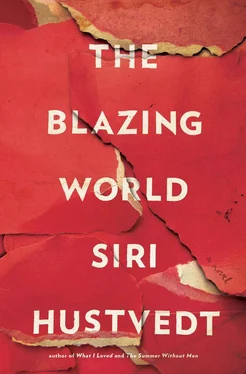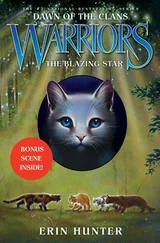Harry hooked her hopes on the letter in The Open Eye . When it’s out, she said, everyone will know. I will be free. But, Harry, I said, it’s a yawner journal, arcane, abstruse. How many people read it? I don’t think Harry had a choice. She had to believe in her imminent triumph. When the magazine finally arrived, she read the letter aloud to me, chortling and crowing, chewing on the quotations that belonged to her, her face as hot as one of her electrified metamorphs. I scolded her for the testicle joke— beanbags , Harry, I said, really. And who is this character Brickman? He’s doing his job, she said. That’s what matters.
I told you so is a phrase for assholes, and since I happen to intermittently find myself in that category, I used it on Harry when Rune screwed her over in the pages of Art Assembly in an interview, in which he was questioned outright about the Brickman letter in The Open Eye . Rune had guts. I have to hand it to him.
Harriet Lord has been really great to me, not only as a collector of my work, but as a true supporter. And I think of her as a muse for the project. Beneath could never have happened without the long talks we had together and her generous backing. What I can’t understand is that she seems to claim she is responsible for my work. She seems to believe that she actually created it. I simply can’t understand why she would say that. You know, she had a really hard time after her husband died, and she’s been in psychiatric treatment for years. For the record, let’s just say she’s a kind lady, but a little confused from time to time, and leave it at that.
I was on-site in the kitchen when the kind but a little confused lady in long-term psychiatric treatment hurled the offending magazine at the pot rack. I was there when she cursed, roared, went cross-eyed and then blind with rage. Head down, arms flailing, she attacked an open shelf, batting mugs, dishes, and bowls to the floor, where they met their spectacular ends in smithereens. After the crash, I knelt on the floor, wielding brush and dustpan to collect thousands of shards, while Harry sat on the floor and said over and over, “I’ll kill him.” The fact that the man had called her Harriet Lord , not Harriet Burden , had shaken extra salt on Harry’s already open wound.
And my refrain was: I told you so. I couldn’t help myself. I had told her so. Harry penned a flaming letter to Art Assembly , which was never published. She phoned Rune and screeched at his voice mail: Liar, thief, horrible, horrible man, traitor. Her vituperation didn’t budge him. Harry contacted Anton Tish’s parents. His mother politely but firmly told her, “My son wants nothing to do with you.” Harry hired a shamus named Paille, a hazy-faced, laconic character with a Maine accent who specialized in blackmail and extortion. Paille tracked the kid to an ashram in India, to Thailand, and then to Malaysia, but after that, the boy’s path ended with his airline records. Paille promised to keep up the quest.
Methodically, deliberately, Harry compiled every shred, morsel, sliver, and dust mote of evidence to prove her case. As she dug into piles, riffled through papers, and hunted for signs of her creative ownership, it dawned on her — a rainy, bleak, gray illumination, to be sure — it dawned on Harry how carefully she had hidden her involvement. She unearthed early drawings in sketchbooks and some plans on her computer, but other drawings and further designs were in Rune’s possession. Her e-mails to him read like cryptograms, as did his to her. No slips. And the assistants, whom she assumed were in the know, were not. Even Edgar Holloway III, old studio hand, Friday to Harry’s Crusoe, had to admit that this time around he hadn’t suspected a thing. All he knew was that Harry had written a check for the work she had purchased from Rune as well as checks for the production of Beneath , but a benefactor is not a creator, and Rune had thanked her in print for her “support.”
Eldridge came through for her. Art Lights published the story of their work, but his page of eloquence touched very few people at the time. Harry’s experiment had been gutted and crushed, and she ranted in protest. Once the gears of despair began to turn, they banged and clinked with the same compulsive music. She had been robbed. No one understood her. No one paid attention to her. They were all blockheads, dupes of creeping sexism and phallus worship. Rune should be drawn and quartered, his eyes scooped out with razor-sharp grapefruit spoons and smashed into jelly with a hammer. Her life’s work had been ruined, the ambitious project carefully constructed from the blocks of her radiant intellect, one beautiful irony on top of another — which would prove once and for all her theories about sex bias and perception and God-knows-what-else had exploded in her face.
I begged her to give it up. Show your work now, I said. Take it to the cooperative here in Red Hook. Forget about pseudonyms and figments, your ironies and philosophies. Who cares about the incestuous art world of dupes and phonies. But Harry couldn’t give it up. Drowning, she clung fiercely to that small, splintered piece of mast bobbing in the ocean we call justice. There is no justice, of course, or very little of it, and counting on it as a life raft is a big mistake.
I wanted to cuddle her in my arms. I wanted to send her to those sweet, high places we had visited a couple hundred times already, but she pushed me away. She barked, sneered, and hissed. I am not the bad guy, I said to her, but somehow that’s what I’d become. One night she sat on the big bed, ferocious in her pain, and she taunted me. Who was I to say a word to her? I had ruined myself, hadn’t I? I had had everything — my Whitmanian gifts, my cock, the powers-that-be on my side — and I had thrown it away. She, on the other hand, had fought, worked and worked and worked like hell, and now she was betrayed. I was pathetic, yellow, a leech that lived off her good graces. (Read, her dough, or rather Lord’s dough.) Words had flown fast and cruel between us before, but this time her voice smacked me to the ground. My jolly, kind beloved had turned hard, sad, and mean. From my metaphorical position, laid out on my back in figurative dust, I called her a castrating bitch.
She stalked out of the room and did not return. After waiting up for her until three in the morning, I walked across the street to my hole and stayed there. We did not see each other or speak to each other for three long months. Most evenings after our breakup, I’d saunter over to Sunny’s with anxious thoughts of spotting Harry, but she was never there. I’d buttonhole some schlemiel at the bar and offer up the rousing but oh-so-sentimental tale of the great Bruno Kleinfeld’s decline and subsequent fall, the story of how it came to pass that the literary hero, K., in a far less glorious incarnation than the one who had preceded him, now drank away his evenings at the local bar, the very same hours of the day he had once spent with Our Lady of the Coats, the last great love of his life. When sufficiently doused and soused, K. moved into lachrymose mode, sniffling over his whiskey and swaying to music that came from the speaker over his head, only a foot above his darling’s drawing of Sunny’s motley regulars, a work of art that caused his heart to cleave in two.
Harry had fled to Nantucket. It’s nice to have houses to mope inside, large and empty, with the beds made up in advance. It was Maisie who called to tell me where Harry had gone. She said she wished we could patch it up, make it square, redo whatever it was that had gone wrong between us. Mother shouldn’t lose you, she said. You must forgive her, she said, as if I were the bad guy again, instead of the pining Romantic, for Christ’s sake. Both leech and castrator held their ground, however. It was a waste, a waste of time, a wasted time. I know that now, but then the world looked different to both of us. What can I say? My pride had been used as a snot rag, or that’s how it felt, so I knotted it up even more tightly, just to make sure it hurt keenly enough to justify my life as a suffering scrivener.
Читать дальше












